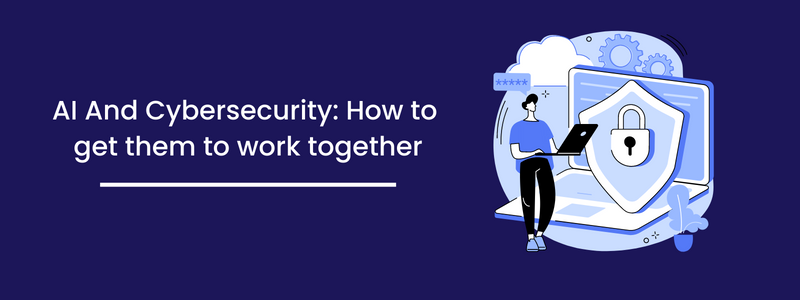AI And Cybersecurity: How to get them to work together

The need for cybercrime protection for your company is greater than ever. It can be challenging to stay on top of things, though, given the enormous volume of data and the continuously changing threat landscape. AI can help in this situation. Artificial intelligence (AI) and cybersecurity are two of the trendiest subjects in business today, and by utilizing AI, companies may significantly improve their ability to combat cybercrime.
The Importance of AI and Cybersecurity
Cybersecurity and artificial intelligence are two of the most significant technological developments of our day. Additionally, they act as a potent force when united to safeguard online safety, secure personal information, and stop cybercrime. Businesses can now conduct transactions faster and more securely than ever before, and accuracy has increased across a number of crucial domains.

Companies can screen for suspicious activity and identify issues immediately before any damage is done with the aid of AI-powered analytics tools. Together, these tools provide a vital layer of security in a world that is becoming more connected, making online activities safer for both individuals and organizations.
Effective cybersecurity, despite being intangible, is essential for reducing possible hazards brought on by the explosive expansion of digital applications today, making it an essential part of any tech-driven landscape. In order to maintain system security over time, businesses must invest in cutting-edge technology like artificial intelligence (AI) and put effective protection policies in place at the same time.
As data breaches increase across all industries today, this will guarantee that the highest levels of security are upheld and that client information is protected round-the-clock. To put it simply, all responsible organizations wishing to arm themselves with reliable defense measures against hostile hackers globally should make understanding the significance of AI and cybersecurity a key priority.
Here are different ways to make AI and cybersecurity work together more effectively:
- Create cybersecurity models using AI.
Building safe and straightforward machine learning pipelines for cybersecurity is the first step towards a strong cybersecurity system. This is due to the fact that AI-based models can only be as accurate as the data they are trained on. The security teams require access to a lot of high-quality data in order to create these AI models. This can be difficult because many firms are reluctant to provide their data owing to privacy and security worries.
However, data may be exchanged safely and utilized to train AI models that can enhance security with the correct tools and policies in place. AI can be used, for instance, to create models that can identify and stop similar assaults in the future using information from previous cyberattacks. The best part is that because AI enables developing end-to-end models with meta-cloud utilization and visibility management, creating these models is frequently simple. Additionally, some services let you start learning right away with free plans.
- Utilize AI To Watch For And Address Threats
Real-time monitoring and response to attacks is another way AI technologies may enhance security. AI has the ability to immediately recognise and respond to cyberattacks. Thus, AI can speed up the process of identifying and responding to threats and/or ransomware assaults, thus enhancing your cybersecurity posture.
AI requires access to data from multiple sources, such as user behavior, system records, and network traffic. It can then make use of this information to find patterns that might point to an assault. AI can then take action to reduce the threat when it has been identified, for example by blocking malicious communication or quarantining infected systems.
- Risk Exposition
To identify new ways to exploit networks, many hackers constantly keep one step ahead of cybersecurity developments. For instance, there was an uptick in phishing assaults that preyed on the dread and apprehension surrounding the COVID-19 outbreak. Additionally, as more people work from home, attacks against remote working tools like VPNs (virtual private networks) have increased. For many organizations, the security risk grew as a result.
Strong and creative endpoint security has become even more crucial as a result of the rise in business endpoints brought on by the remote working revolution. Many IT professionals are currently concentrating on the security of relatively new IT components like containers (see more on Kubernetes versus Dockers) and gadgets that intermittently connect to the corporate network, like mobile phones, tablets, etc.
- Security audits and penetration testing
The process of attempting to break into a system to evaluate its security is known as penetration testing. The process is typically carried out manually, although AI can be utilized to automate it. AI can be used to find weaknesses in systems and then produce exploit code that can be used to exploit such weaknesses.
Another area where AI can be useful is security audits. Systems can be automatically audited with AI to find any potential security flaws. For instance, smart contract audits can make use of AI to find potentially dangerous flaws in the code. As a result, security auditing is more accurate and efficient overall.
- Risk Prediction and Risk Control
AI is able to foresee the hazards of cyberattacks and pinpoint the elements that increase an organization’s vulnerability. It can analyze prior assaults to find trends that might portend forthcoming assaults. A risk profile for an organization can then be created using this information. This risk assessment can help firms prioritize security efforts and concentrate on the most vulnerable regions.
Strong AI is crucial for breach risk prediction because it can sift through a lot of data to uncover the minute elements that can make a big difference. You can take the required precautions to avoid a cyberattack by using AI algorithms to forecast when, when, and how it will occur.
Conclusion
AI has the potential to significantly enhance your overall cybersecurity posture. A real-time picture of the cybersecurity landscape can be obtained by employing AI technologies to construct models, monitor and respond to threats, automate penetration testing, and perform security audits. This will enable you to take precautions before a risk turns into an attack.
Need to know more? Then follow us at F60 Host
